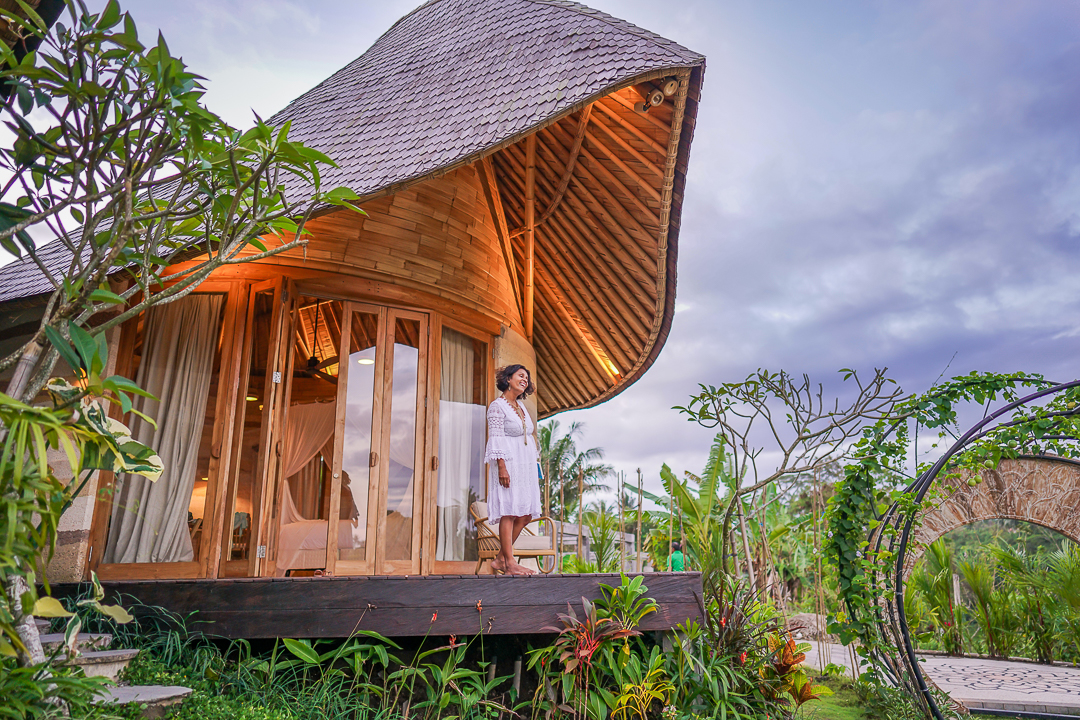More travelers are seeking meaningful and immersive experiences rather than just ticking boxes at a rapid pace.
As I listened to these words from Regal Star of Jasri Bay Hideaway, a small but elegant seaside hotel in east Bali, about the rise of slow travel in the post-pandemic era, I couldn’t help but reminisce about the experience of embracing the culture of a place and immersing oneself so deeply that you become a part of it.
I have been a slow traveler myself for many years, beginning from when I traded in a Datsun 1977 pick-up truck for a bicycle and pedaled my way from Ventura, California to Alaska. This experience allowed me to open my world slowly and explore the United States’ back roads at a rate of only 60 kilometers a day. I met people daily who were fascinated by my journey.
I was invited into people’s homes, enjoyed authentic American hospitality, and cycling at a leisurely pace gave me a new perspective to come to know the local people in a deeper way. I traveled the United Kingdom and Europe by bicycle and further afield to New Zealand and Australia. For me, slow travel is intentional, mindful travel – it fills the soul. It transforms how we interact with another culture and get closer to it.

Growing Trends
Today, more travelers are seeking the same authentic slow-travel experience.
The era of staying at larger hotel complexes is giving way to staying at boutique places like Jasri Bay Hideaway, where they arrange for guests to visit local artisans or shamans, go on guided rice field walks, partake in a Balinese water-purification ritual by invitation, and visit a nearby mystical and sacred holy water spring.
It has also led to a greater preference for places that focus on nature and sustainability, like Solana Luxury Wellness Retreat on the outskirts of Ubud, with just 10 villas in a stunning jungle setting with access to a waterfall.

“We constructed our villas from bamboo with the ancient technique of rammed earth. We used the earth from our land and locally sourced limestone. Our guests love the encompassing nature and the natural feel of the bamboo lodgings,” Anshu, the founder, explained. The river villas at Solana face a beautiful waterfall and lush green jungle, a setting that allows for a very powerful connection with nature and that heals from within.
The increased preference for slow travel options post-pandemic is palpable across the archipelago.
Aska, the owner of Mana Earthly Paradise, a small eco-boutique property in Ubud, Bali, said they received a flow of domestic travelers from Jakarta for the first time after the lockdowns.
“Pandemic restrictions kept people locked into their city apartments. As soon as restrictions were lifted, they came to Bali in large numbers, seeking fresh air, nature, open spaces and a hotel like Mana, which appeals to the eco-conscious traveler,” Aksa said.
Sugeng Suprianto, who founded Top Indonesia Holidays in 2009, said he has similarly seen an increased demand for slow travel since the pandemic. Having recognized a gap for this type of travel a decade ago, he founded his company based on nature and cultural travel, crafting customized experiences throughout the archipelago by exploring the spectacular and pristine nature unique to Indonesia.
“It was mass tourism, basically,” he said. “I felt a need to cater to the slow travel experience. People who fly from big cities to destinations in Indonesia want to hike, snorkel in Indonesia’s pristine dive spots, travel under the power of a mighty sail and walk with the birds of paradise.”
By incorporating cultural visits to remote villages, engaging in sustainable tourism activities, and exploring the wilderness, it was an approach that resonated deeply with those seeking more from their travels than just collecting passport stamps.
Beyond Indonesia
The allure of slow travel, of course, extends well beyond Indonesia’s borders.
Emerald, a traveler from the US, told me he stayed in locally owned accommodation and participated in local ceremonies with residents in recent trips to Bhutan and Thailand, where he spent an average of one week in each place. His comment was telling: “I had many wonderful chance encounters. Locals offered to show me their favorite restaurants and took me on their local walks in nature. Because of my own deep spiritual resonance, I visited their more remote and smaller temples and shrines.”
That is a testament to slow travel’s power to unlock hidden treasures and forge connections that last a lifetime.
Pascale, from Canada, advised, “Try and carve out one month if time permits. Really explore because you can taste what is available in an area rather than box-ticking fast-paced tourism.”
Her words echo the sentiment behind slow travel; it’s about taking the time to reach out on another level and really learn what makes us different from each other and benefit from exchanging with someone from another culture.
Even for those with limited time, there are ways to embrace the principles of slow travel. Business travelers can always add some extra days and absorb a local experience.
Why stay in a business hotel? All you need is Wi-Fi, and this is available everywhere now. Eco-conscious accommodation stays are springing up everywhere. Finding a boutique stay surrounded by nature helps balance stress levels, which many businesspeople endure by the demands of business travel.
As I reflect on the stories of those who have embraced slow travel from the hospitality side to the traveler within, I’m reminded that slow travel is a deliberate, mindful choice filled with the magic of immersive experiences. The world is vast and beautiful, and slow travel beckons us to explore it in a way that honors its depth and diversity.
To be a Slow Traveler:
· Choose your destination wisely: Choose places committed to sustainable tourism with rich cultural and natural heritage.
· Take eco-conscious transportation: Prioritize eco-friendly travel like public transportation, walking and cycling. Reduce air travel and choose trains or buses when possible.
· Book sustainable accommodation: Stay in locally owned, eco-friendly places like boutique hotels, guesthouses, or ecolodges.
· Support local: Shop at local markets, dine at local restaurants and support local artisans.
· Connect to the local culture: Engage with the community and partake in cultural experiences. Learn and respect local cultural norms and etiquette before you arrive.
· Conserve resources: Save water and energy by turning off lights and appliances. Take shorter showers. Re-use towels.
· Take responsible tours: Pick an eco-friendly tour operator and activities with minimal environmental impact.
· Leave no trace: Adhere to leave-no-trace principles by not littering, preserving local wildlife and leaving nature untouched.
· Volunteer or donate: Consider volunteering or donating to support sustainable development in the local area.
Slow travel experiences
· Pejeng, Ubud Bali Village Tour: Take a guided village walking tour, explore an organic farm, cycle and visit a weaver’s home. togethernessproject.net
· Bali Healing Day Tour: Go on an immersive spiritual experience in a small village, Tulikup, in Bali, where you meet a Balinese priest and discover peace of mind through a healing session and a Balinese ritual. balihealingtours.com
· Five Pillar Experiences: Choose a unique impact travel experience in Bali from this social enterprise initiative. fivepillarexperiences.com
· Kalimantan: Explore forest wilderness areas and Dayak culture, and spend time with orangutans in their natural habitat.
centralborneoguide.com
· Travelling Spoon: Take a private and authentic cooking class with expert cooks in their home kitchens around the world.
travellingspoon.com
Story by Stephanie Brookes
Contributor, Jakarta Post
Published: February, 2024

